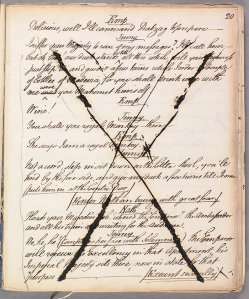 My first post of the A to Z Blogging Challenge – the letter A and the theme for this year? British Theatres through the ages.
My first post of the A to Z Blogging Challenge – the letter A and the theme for this year? British Theatres through the ages.
How to begin? There are plenty of theatres in London, and I will be touching on several, but today I’m starting out in a small provincial town, one that is personal to me. My parents grew up in the Fenlands of East Anglia. This town is where my grandparents are buried, my father went to school and the family had a shop. Unfortunately, in the middle of the twentieth century there was no theatre.
There used to be. The Angles Theatre of Wisbech, a Georgian Playhouse opened in 1790. Built by Mr Miller and Mr Robertson in Deadman’s Lane. The theatre ran until 1850 when it turned into a concert house, then a school. In 1979, it reopened as a theatre.

Theatres in England were more likely to be temporary structures. A dedicated building was quite an undertaking. So was writing a play.
In 1790 John Larpent (1741-1824) was the Examiner of Plays. He would have read the first play put on at the Angles Theatre and given it a license for performing. He read every play written during his period in office. Why?
In 1737 an Act of Parliament was passed creating the Office of Examiner of Plays. A pivotal moment in the history of theatres. Its purpose was to control and censor what was said about the government in plays to prevent revolutionary ideas spreading. Free speech in the theatre was hamstrung. The Lord Chamberlain was the official censor, the role held from 1737 to 1968 when the act was replaced with a new one. He was responsible for all the plays written during that period. (The Earl of Cromer was the Chamberlain from 1922 to 1938. During his tenure, he licensed 13,000 plays and refused 200.) However, it was more likely the Examiner of Plays did the hard graft. He read the play, wrote a synopsis and a recommended a license. The examiner was also required to visit the playhouse to ensure it was safe.
Who were the examiners? Journalists, playwriters, actors and producers, but not all were qualified. Larpent was a clerk at the Foreign Office. His documents were sold by his wife after his death, and are now an archived collection. If he didn’t like something, he put a big X through it or wrote ‘unfit for presentation’.

The Examiner or inspector of plays wasn’t actually a new thing. The forerunner was the Master of Revels. A prestigious job in the royal household. Under Elizabeth I, Edmund Tilney was the Master (In the film Shakespeare in Love, he was played by the wonderful Simon Callow). He was hard to please. He did however license thirty of Shakespeare’s plays. In the 17th century, the censorship relaxed, especially under the Restoration of Charles II. So, by 1737, the government stepped in and passed the Theatres Act of 1737, to ensure the morality and stability of the country.
Fortunately for the Angles Theatre of Wisbech their first play, The Battle of Hexham, performed on May 20th 1791, was successfully licensed by John Larpent.










There is nothing quite like being in a theatre to watch a play (although being in the cinema to watch a play comes a close second and is much easier these days) – our local theatre has so many members it’s hard to get tickets if you aren’t subscribed, which is good for them at least!
Hope you are safe and well and April goes swimmingly.
Tasha 💖
Virginia’s Parlour – The Manor (Adult concepts – nothing explicit on blog)
Tasha’s Thinkings – Vampire Drabbles
LikeLiked by 1 person
Thanks for stopping by. I hope you’ll enjoy the rest of my posts. It’s good way to distract oneself, focusing on a project.
Stay safe, too.
LikeLike
Happy A to Z! Lovely theme! 🙂
When my father was a teenager, under the communist regime in Hungary, his rock band had to submit all their lyrics to a censor before they could play any gigs. They absolutely hated it…
I was trying to read that page with the X to see what was ‘unfit’ in it, but I can’t make it out 😀
LikeLiked by 1 person
I couldn’t make out what was under the X either. I suppose it depended on the taste of the examiner. Unfortunately, I think Hungary is slipping backwards.
Stay safe.
LikeLike
Fascinating! I didn’t know any of this, though I remember when I wrote my Weimar Cabaret series last year, I discovered something similar happened in the Weimar Republic too. But since Cabaret was a very peculiar kind of entertainment, I thought that was something specific to it.
Theatre is really i fascinating, very peculiar place. Almost a world of itself.
@JazzFeathers
The Old Shelter – Living the Twenties
LikeLiked by 1 person
I had no idea the censorship lasted until 1968. I’m discovering lots of interesting things during my research – it’s probably why I love doing this challenge.
Thanks for stopping by.
LikeLike
I simply love theatres. This is fascinating and something I’d never given any thought to. One of my favourite theatres is the Tunbridge Wells Opera House. It’s only used for two performances a year – the rest of the time it’s a Wetherspoons pub! But it’s still fully preserved inside and out.
My A-Z tale!
LikeLike
Theatres have doubled up as all kind of buildings and have more lives than a cat!
LikeLiked by 1 person
Theatres are always beautiful buildings, well most of the time.
Feel free to share your A post here at the A to Z Challengers Linky Party
LikeLiked by 1 person
Thanks for stopping by.
LikeLike
That’s really interesting. I never realized there was an actual role in charge of censoring. Weekends In Maine
LikeLiked by 1 person
Neither did I, and until 1968!
LikeLiked by 1 person
[…] counter the restrictions of censorship that were still in place at the time – see my post on Acts and Angles. Instead of performing them under ‘theatre’ conditions, plays were performed under […]
LikeLike
[…] only be performed in patent theatres, and there weren’t many, while the plays themselves were censored by the Chancellor’s office, forcing most theatres to concentrate on musical acts, operas and […]
LikeLike
[…] Damm and Henderson managed to convince the Lord Chamberlain, the man responsible for censoring theatres, that stationary nudes were no different from nude statues that filled the hallways of stately […]
LikeLike